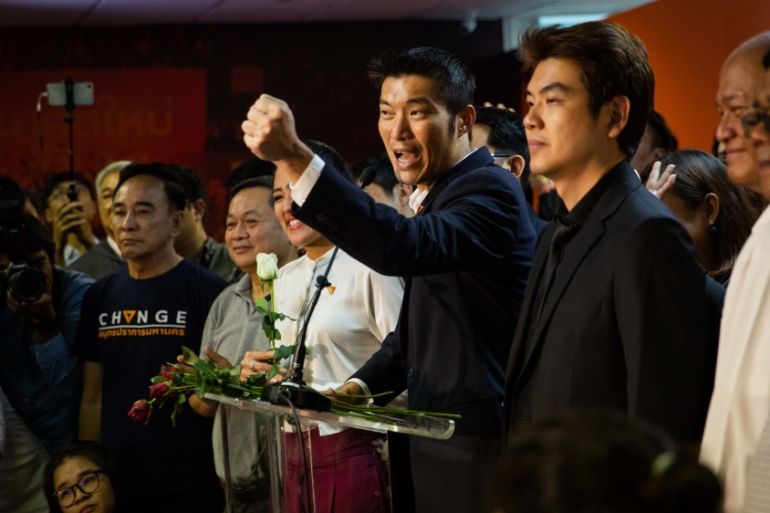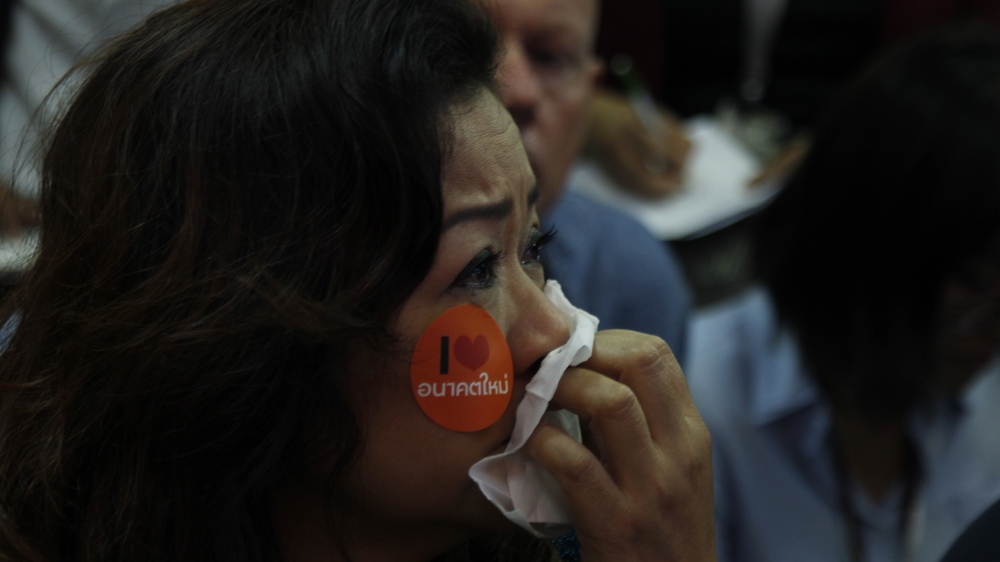Thai court dissolves opposition party over ‘illegal’ loan
Future Forward Party accused of breaking election-funding laws over a $6m loan it received from its billionaire founder.

Bangkok, Thailand – Thailand’s Constitutional Court ruled on Friday to dissolve the country’s most dynamic opposition party over claims it broke election laws.
The Future Forward Party (FFP) and its leader, Thanathorn Juangroongruangkit, were accused of breaking election finance laws when he loaned 191.2 million-baht ($6.06m) to his party during the campaign last year.
Keep reading
list of 3 items‘Remember forever’: Thai city grieves for mass shooting victims
Thailand’s March 24 vote will not matter
The court also banned 16 FFP leaders from politics for 10 years.
FFP headquarters was full of FFP supporters yelled in anger as the verdict was read by a panel of judges via live feed. Anger soon turned to tears as the energy in the room swiftly turned sombre.
Thanathorn, an auto-parts billionaire-turned-politician, admitted to loaning the money to finance political activities. But he maintained that the country’s electoral law allows such a loan contract.
Since its establishment two years ago and following its strong showing during the March 2019 parliamentary elections, the FFP and Thanathorn have come under fire from the current government of Prime Minister Prayut Chan-ocha.
In January, the party narrowly escaped a separate attempt at disbandment, after being acquitted of trying to overthrow the monarchy – allegations that the FFP and Thanathorn have strongly denied.
The party is also accused of being anti-military, for supporting policies against forced conscription, among other allegations. To date, it has faced at least 28 legal challenges.
“If you think disbanding us is going to stop us from getting involved in politics – you’re wrong. Thanathorn and I will get involved even more… This is not the end, this is the beginning. We are monsters created by Time to haunt people from the old era” said party Secretary General, Piyabutr Saengkanokkul.
A defiant Thanathorn said: “I would like to start Future Forward Committee for people who want to carry on the beliefs of Future Forward Party.”
In an interview with Southeast Asia Globe earlier this week, Thanathorn declared that he and his party were innocent of the charges, adding that they will continue the fight.

Although it is not unheard of for party leaders to loan large sums of money to their own campaigns, the election commission is adamant that Thanathorn broke the law.
Political observers speculate that if the party is dissolved, supporters could mobilise online and on the streets. Many of the party supporters are young and highly active on social media.
“It’s deja vu all over again in Thai politics,” Thitinan Pongsudhirak, political science professor at Bangkok’s Chulalongkorn University, told Al Jazeera.
“It used to be the Thaksin party machine that gets dissolved. But now it’s Thanathorn and his Future Forward Party,” he said referring to former Prime Minister Thaksin Shinawatra, who now lives in exile after he was deposed in a military coup in 2006.
Thitinan predicted that the FFP “would significantly become weaker” after it was dissolved, as some parliament members might switch camp.
“But I think the party as a political movement will grow because of the forces of history in favour of popular rule and of vested interests in younger people wanting a say for their own future.”
Yingcheep Atchanont, project manager at iLaw, an organisation of lawyers focusing on freedom of expression, told Al Jazeera: “As an institution that was a cornerstone for representing a democratic system, the political party [FFP] as an institution, should not have been dissolved unless it committed a grave breach against a democratic system or showed an attempt to achieve political power through unconstitutional or undemocratic means,” Atchanont said on the controversial court ruling.
Supporters of FFP are now left wondering what’s next for the dissolved party and its leaders, with many thinking about the possibility of new protests.
“Personally, I support every political party who fight for democracy and equality. The main reason that I support FFP is because they fight against dictatorship, even though they might be attacked in many ways,” said Boss, a software engineer living in the capital, Bangkok.
“I do not want to go join any protest at this moment because I think that they [the military] will prepare to crack down on protesters, and it could be worse than Red Shirt protests in 2010 when many people died,” Boss said, referring to Thailand’s 2010 pro-democracy protests.
During those demonstrations, at least 87 people were killed in the military crackdown against the anti-establishment ‘Red Shirt’ protesters.
“But, if I have to fight for justice, I will join the protests.”